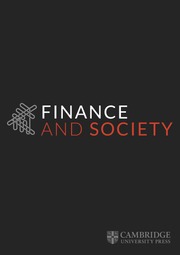Article contents
After the boom: Finance and society studies in the 2020s and beyond
Published online by Cambridge University Press: 09 November 2023
Extract
The crisis of 2008 was a watershed event for the study of finance and society. There was the boom in financial markets that came to a head with the collapse of Lehman Brothers, and there was the boom in financial scholarship that followed in its wake. But what comes after this second boom? After more than a decade of rapid expansion under the shadow of 2008, what comes next for the new finance studies? What are the emerging debates that matter most? Where lies the need for further theorisation and for new empirical work? In this editorial, these questions are pursued under three broad headings, each corresponding to an overarching imperative: first, the need to keep a vigilant watch on the core institutions and logics of finance; second, the need to continue expanding and deepening the field; and third, the need to persist with difficult lines of questioning.
Keywords
- Type
- Editorial
- Information
- Creative Commons
- This is an Open Access article, distributed under the terms of the Creative Commons Attribution-NonCommercial-No Derivatives licence (http://creativecommons.org/licenses/by-nc-nd/4.0/), which permits noncommercial re-use, distribution, and reproduction in any medium, provided the original work is unaltered and is properly cited. The written permission of Cambridge University Press must be obtained for commercial re-use or in order to create a derivative work.
- Copyright
- © 2022 The Author(s)
References
- 8
- Cited by


